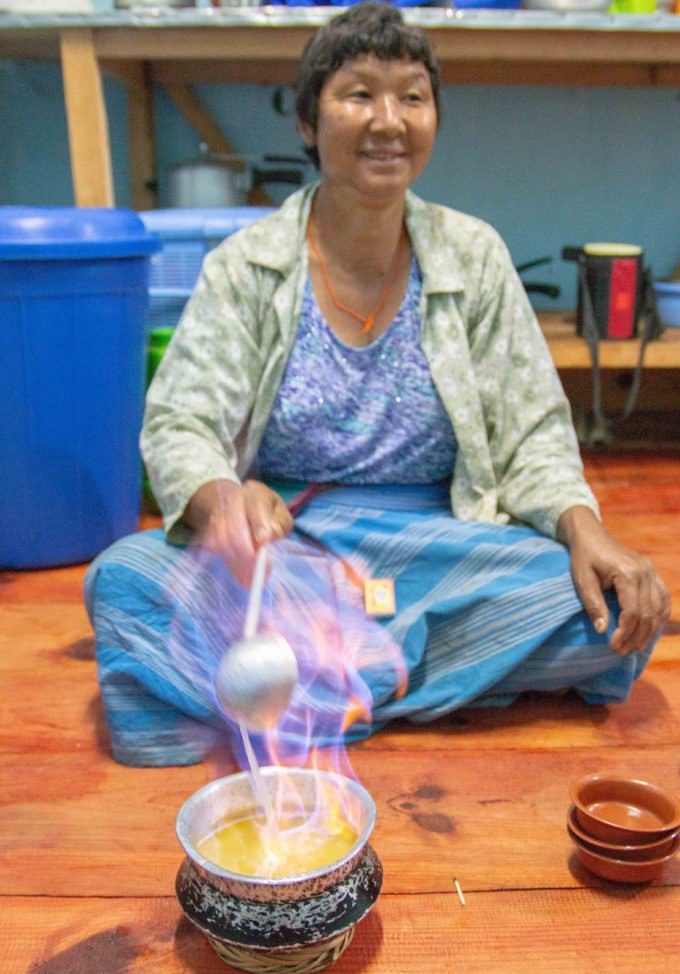
Made with egg and fire, served hot and neat

Made with egg and fire, served hot and neat
Ara in Bhutan
“What does your husband study?”
“I don’t know,” replies the 22-year-old Bhutanese mother. Her husband has been gone for two years. I refrain from asking any more questions; instead, perhaps to deviate the conversation to something happy, her mother, who lives with the family, begins to make a pre-dinner drink.
Made from barley, rice or wheat, ara is served hot and neat, or, it can be turned into an event, which I’m about to witness in the kitchen of this family farmhouse in Punakha, the agricultural capital of Bhutan.
The grandmother, in her ankle length kira skirt and sporty short hair, is my age, but the deep lines on her face and weathered hands reveal her tough farming life.
Melting butter in a copper pot, she then cracks an egg into the bubbling fat. The mixture is creamy and chunky.
My guide and driver both sit on the wooden kitchen floor with me in a circle. “Are you ready for this?” laughs Rinzin, my guide. My driver holds his hands to his mouth and snickers. It seems like they are all in on a private joke.
Grandma carries the pot from the gas stove and puts it in front of us on the floor, then sits down cross-legged and begins her performance.
In her copper pot of egg and butter, she tops it up with a clear liquid, ara, the national drink. Then, striking a match with one hand, she drops the match onto the mixture, and poof! The flame shoots up. Behind the flame that reaches her chin, she’s smiling and scooping up the flaming mixture, mixing the ara, eggs, and flames like a sorcerer. She covers the pot with a lid to stop the fire. Then, she ladles out the wine into our little cups.
“Are you having some?” I ask her. “No,” she says emphatically, as if to say, I know better than to drink this! But as she slowly ladles out the wine, giggling to herself, it seems like she is aware of the consequences of ara overconsumption. This moonshine-style beverage is illegal to sell, but most Bhutanese make it in their home.
Before sipping the wine, Rinzin dips his ring finger into the wine and flicks the drops onto the floor. “This is an offering to the spirits… they are all around us. We make an offering to ensure they are satisfied … and you can accumulate merit.”
The mother encourages me to drink up, and reveals her red teeth, a result of chewing betel nut, a mild stimulant that creates a warming sensation.
The ara tastes like chewy sake.
The mother watches as my face squints—like eating lemons—with each sip. This makes her laugh even louder.
Up Next
Dumplings for Breakfast Are Totally Worth the Food Coma
You Can’t Come to Bhutan and Not Try the Peach Wine, Apparently
It looked more like wine than I’d expected: like a pale, faintly green sauvignon blanc, almost.
Far From the Rooftop of the World
Dharamsala in the Himalayan foothills may be the most iconic Tibetan town in India, but for an unfiltered glimpse of the real life of the Tibetan exiles, you have to head south to the former refugee settlement of Bylakuppe.
A Sea Grain to Feed the World
A team of chefs and scientists in southern Spain are trying to cultivate an edible sea grain for the first time. Can Aponiente’s “sea pantry” fight global food insecurity and be used for conservation purposes?
The Rebel Saint of South Sudan
After 30 years of service in Sudan, often defying her superiors’ orders, a remarkable Indian nun is forced to ask herself whether she’s made any difference at all.






